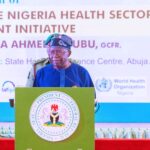Enugu State Governor Peter Mbah has reaffirmed his administration’s commitment to making the state an agricultural hub for investors to thrive.
Mbah stated this while unveiling the Enugu Rice at Enugu’s Ministry of Agriculture and Agro-Industrialisation complex. The governor, through his Deputy, Mr Ifeanyi Ossai, praised the Commissioner for Agriculture and Agro Industrialisation, Mr Patrick Ubru, for his efforts in making the event a reality.
“I am impressed by what I see today; it is very encouraging. I commend the farmers of Enugu State, and I am confident that with your synergy, support, and cooperation to the Enugu State Government, rice production will continue to increase for the benefit of all.”
“This is the advancement we’ve been waiting for, as well as We are hoping for growth. Our tomorrow has arrived.”
He urged ministry staff to be dedicated to their duties and to provide maximum support to the commissioner in order for the ministry to achieve the state’s mandate and vision for agriculture. Mbah stated that the Enugu rice brand would expand beyond what it was previously known for, emphasizing that the state would soon be known as a rice producing state.
He explained that Enugu was now an oil-producing state that was also doing well in agriculture, adding that “this will help to reduce hunger to zero by 2031.” Earlier, Ubru praised the governor for his dedication to the sector’s rebirth and development.
He stated that it was a special occasion testament to their collective efforts in promoting and emphasising the authenticity and originality of the Enugu rice brand. The commissioner emphasized that it provided an opportunity for the state to highlight the exceptional quality of its locally produced rice while also celebrating the farmers’ hard work.
He maintained that the launch was intended to promote the brand’s uniqueness while also providing farmers with the opportunity to make significant sales and increase their income. He stated that the rice would be sold at the lowest possible price in order to make it available to all, improve their livelihoods, and boost the local economy.
Ubru stated that the state government had directed his ministry to ensure the establishment of more rice mills across the LGAs with the assistance of the state government.
Rice production has a comparative advantage.
“These mills will transform rice processing in our state, increasing self-sufficiency and economic growth.”
He stated that this will be accomplished by utilizing over 50,000 hectares of rice fields in various locations at Idodo-Owo-Ubagu-Amankanu-Nkerefi-Nara-Ugboka rice fields in Nkanu East LGA.
“Others are Ibiteolo-Mgbagbu Owa rice fields in Ezeagu LGA, Oduma-Nenwe-Okpanku rice fields in Aninri LGA, Adani-Okoro-Ogurugu- Asaba rice fields in Uzo-Uwani LGA and rice fields in Isi-Uzo LGA” .
He went on to say that Mba’s vision was to feed the people of Enugu and turn the state into the nation’s food basket, as evidenced by the payment of counterpart funds for donor-assisted agricultural projects.
These include the payment of arrears for the Agricultural Transformation Agenda dating back seven years.
The first payment for the new Livestock Productivity and Resilience Support Project (L-PRESS) was made under the ATASP-1. The payments include a three-year payment for the IFAD-assisted Value Chain Development Programme.
Mr Edward Isiwu, State Programme Coordinator of IFAD-VCOP, stated that some farmers from Abakiliki had now come down to Nara, Nkerefi, Nomeh, and Ubahu to cultivate rice on leased land, which they sold as Abakiliki rice. He requested that the state government provide them with some land to cultivate rice on in order to help increase the state’s production of the grain.
Mrs. Ihuoma, Project Coordinator of the World Bank-assisted Agro-Processing, Productivity Enhancement, and Livelihood Improvement Support (APPEALS), stated that cultivation and livelihood improvement should be prioritized.
The Programme Coordinator of ATASP-1, Mr Romanus Egba, added that the primary objective of the programmes was to support farmers with the necessary inputs which included weighing scale, fertilisers, improved seedlings and climate smart mat






